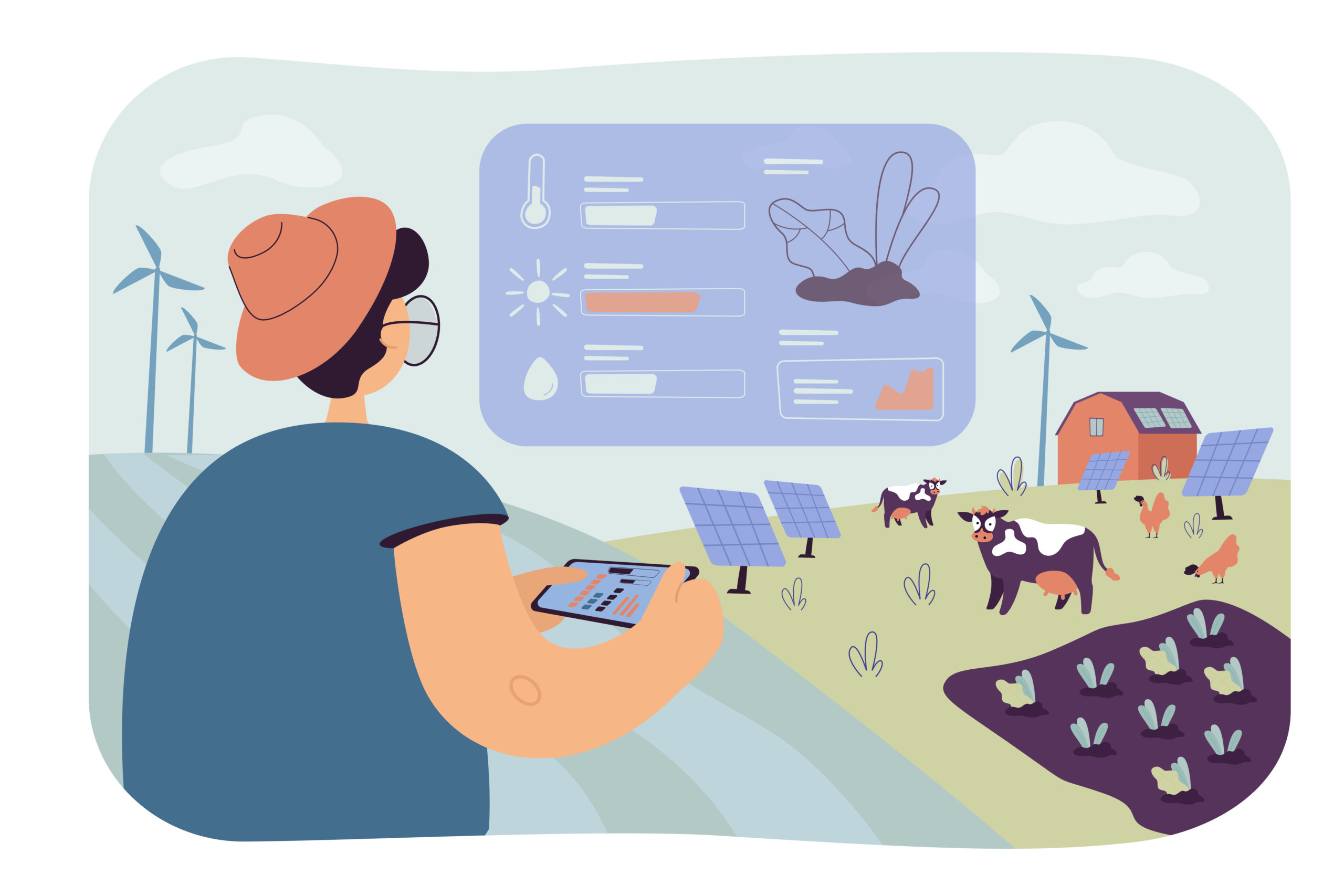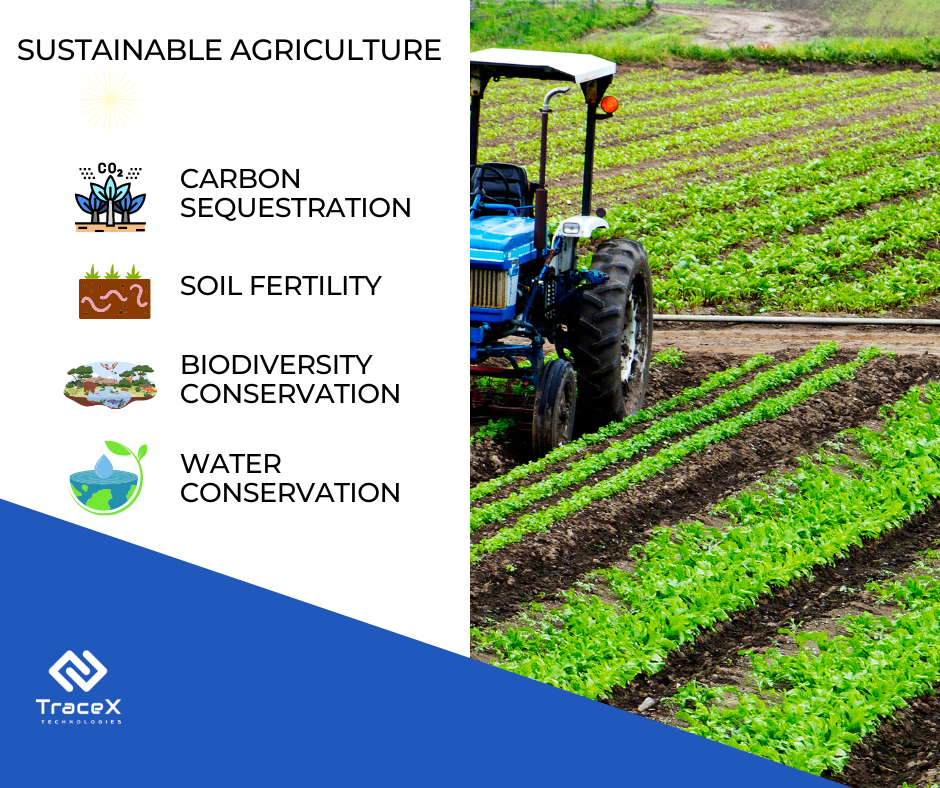Contact: +91 99725 24322 |
Menu
Menu
Quick summary: Explore the future of agriculture with our Farm Management Software. Learn how innovative solutions are reshaping farming practices for sustainability, efficiency, and environmental stewardship. Uncover the key features driving the success of sustainable agriculture in the digital era

In the digital era, technology emerges as a transformative force, offering Farm Management Software (FMS) as a powerful tool to navigate the complexities of modern agriculture. Embarking on a sustainable agriculture journey requires more than just planting seeds; it demands smart and efficient farm management From optimizing resource use to enhancing productivity and environmental stewardship, FMS plays a pivotal role.
According to World wildlife Fund Agriculture is the world’s largest industry. It employs more than one billion people and generates over $1.3 trillion dollars’ worth of food annually.
Farm management software plays a crucial role in advancing sustainable agriculture by enhancing efficiency, resource utilization, and decision-making. It enables farmers to optimize crop yields, monitor environmental impact, and promote responsible practices for long-term agricultural sustainability.
Technology serves as a key catalyst in overcoming challenges faced by modern farming. Innovations like precision agriculture, IoT sensors, and data analytics empower farmers to tackle issues such as resource scarcity, climate change, and market fluctuations. Integrating technology into farming practices fosters resilience and adaptability, contributing to a more sustainable and productive agricultural sector.
This blog will delve into the realm of Farm Management Software, exploring its features, benefits, and how it becomes a linchpin in cultivating a future where agriculture harmonizes with sustainability. Join us as we navigate the landscape of sustainable farming empowered by cutting-edge technology.
In the face of a growing global population and increasing demand for food, the imperative of sustainable agriculture becomes ever more apparent. This approach offers a comprehensive strategy to sustainably meet our food needs while lessening the environmental toll.
Central to sustainable agriculture is its capacity to optimize resource utilization. Through practices that conserve water, protect soil health, and limit the use of harmful chemicals, it mitigates resource depletion and maintains the equilibrium of ecosystems. Moreover, it champions biodiversity and preserves genetic diversity, ensuring the robustness of our food production systems.
Beyond resource optimization, sustainable agriculture emerges as a potent ally in the fight against climate change. It actively works to curtail greenhouse gas emissions, fostering carbon sequestration. Embracing renewable energy sources, advocating for agroforestry, and implementing effective land management practices all contribute to a collective effort to address and mitigate the impacts of climate change.
Farm management serves as a valuable tool for farmers, offering a streamlined approach to their operations, enhanced resource management, and the implementation of sustainable farming practices. By providing farmers with data-driven insights, these tools enable informed decision-making, fostering environmental stewardship, economic viability, and long-term sustainability in agriculture.
Farm management software, equips farmers with tools to optimize crop planning, monitor growth stages, and track inputs like fertilizers and pesticides. These applications empower farmers to make informed, data-driven decisions, minimizing resource wastage and reducing the environmental impact of farming practices. They offer insights into crop health, facilitate pest and disease management, and provide yield predictions, enabling farmers to implement sustainable and efficient farming techniques.
In the realm of farm mapping and precision agriculture, FMS leverages technologies like GIS and satellite imagery to generate detailed maps of farm fields. These tools empower farmers to analyze soil variations, optimize seed planting, and precisely apply inputs like fertilizers and pesticides where they are needed. Through the minimization of resource overuse and enhancement of crop targeting, these applications play a pivotal role in promoting sustainable farming practices and environmental stewardship.
Water, a crucial resource in agriculture, demands efficient use for sustainable farming. FMS aids farmers in tracking soil moisture levels, weather patterns, and crop water needs. By offering real-time data and analytics, these tools empower farmers to optimize irrigation schedules, minimize water wastage, and preserve this precious resource. This contributes significantly to sustainable water management practices in agriculture.
Inventory management equips farmers with tools to systematically monitor and oversee their agricultural input and product inventory. These software applications facilitate the recording of stock levels, monitoring expiration dates, tracking usage, and streamlining the procurement process. Through the optimization of inventory management, farmers can reduce waste, guarantee the timely availability of inputs, and enhance overall operational efficiency on the farm.
Sustainable agriculture extends beyond on-farm practices, encompassing the entire supply chain. In terms of supply chain management, FMS aids farmers in monitoring and overseeing the movement of their agricultural products from the farm to the market. These tools empower farmers to enhance traceability, reduce waste, and uphold fair trade practices, fostering a more transparent and sustainable agricultural value chain.

Overall, farm management software plays a crucial role in fostering a balance between economic viability and environmental responsibility in modern agriculture.
In agribusiness, Environmental, Social, and Governance (ESG) considerations are gaining prominence as essential elements of responsible and sustainable practices. ESG factors have become integral to the decision-making processes of agribusinesses, aligning with global trends that emphasize corporate responsibility.
Embracing these considerations not only aligns with global sustainability goals but also positions agribusinesses as key contributors to a resilient and ethical food production system. As consumer awareness grows, ESG practices are becoming essential for maintaining competitiveness and securing the trust of stakeholders in the agribusiness sector.
With the global population currently at eight billion and anticipated growth in the future, the notion of unlimited, untapped natural resources is no longer a reality. Consequently, sustainability—ensuring the preservation of available resources for the future—has become indispensable for the continued survival of humanity. In the realm of sustainable agriculture, which is crucial for establishing resilient and abundant food systems, the key lies in adopting precision farm management practices and techniques.
The advent of new technology has ushered in agile farm management, enabling farmers worldwide to adapt and produce sufficient food to feed the growing global population while facing challenges such as climate variations and economic conditions. This modern technology not only supports adaptability but also fosters more efficient management systems, ultimately leading to increased profitability in agricultural production.
The integration of precision farming technologies with farm management software enhances agricultural practices by leveraging data-driven precision. This synergy allows for seamless coordination between devices like GPS-guided machinery, drones, and automated equipment. Farmers can optimize tasks such as planting, harvesting, and resource application with pinpoint accuracy, leading to improved efficiency and resource management.
Precision agriculture contributes to sustainable practices by minimizing resource wastage. Through precise application of inputs, such as fertilizers and pesticides, and targeted irrigation based on real-time data, farmers can reduce environmental impact while maintaining or increasing crop yields. This precision-driven approach fosters sustainability by promoting responsible resource use and minimizing the ecological footprint of agricultural activities.
Common challenges in adopting farm management software for sustainable agriculture include initial costs, technological barriers, and resistance to change among farmers. Limited access to reliable internet connectivity in rural areas can also impede seamless integration.
Strategies to overcome these obstacles involve providing financial incentives or subsidies for software adoption, offering comprehensive training programs to enhance technological literacy, and fostering a supportive community for knowledge exchange. Government initiatives and private sector collaborations can play a pivotal role in addressing connectivity issues. Additionally, highlighting the long-term benefits, such as increased efficiency and sustainability, can encourage farmers to embrace and successfully implement farm management software.
TraceX farm management software revolutionize crop and farm management by providing farmers with cutting-edge tools and insights that enhance productivity, sustainability, and overall efficiency.
TraceX integrates advanced technologies like GPS and satellite imagery, enabling precise mapping of farm fields. This empowers farmers to implement precision farming practices, optimizing seed planting, fertilizers, and pesticides with unparalleled accuracy. The result is resource-efficient farming that minimizes waste and maximizes yields.
The software offers real-time monitoring of crucial factors such as soil moisture levels, weather conditions, and crop water requirements. This data-driven approach allows farmers to make informed decisions on irrigation scheduling, reducing water waste, and ensuring optimal crop health. This is particularly vital for sustainable water management in agriculture.
Efficient inventory management is facilitated through TraceX, allowing farmers to track and manage their agricultural inputs and products seamlessly. By maintaining accurate records of stock levels, monitoring expiration dates, and streamlining procurement processes, farmers can minimize waste, ensure timely availability of inputs, and streamline operations.
TraceX extends its impact beyond the farm gate by assisting in supply chain management. The software enables farmers to track and manage the movement of agricultural products from the farm to the market. This enhances traceability, minimizes waste, and ensures fair trade practices, contributing to a transparent and sustainable agricultural value chain.
With a focus on environmental, social, and governance (ESG) considerations, TraceX aids farmers and companies in meeting reporting requirements. The software facilitates transparent reporting on resource usage, waste management, greenhouse gas emissions, labor conditions, and supply chain transparency, ensuring compliance with evolving regulations.
TraceX solutions provide an integrated platform that transforms traditional crop and farm management into a tech-driven, sustainable, and environmentally responsible endeavor. Farmers can leverage these tools to navigate the challenges of modern agriculture while contributing to a more efficient and resilient food production system.
In conclusion, the evolution of farm management software stands as a beacon for sustainable agriculture, integrating emerging technologies to address complex challenges. The symbiosis of precision farming technologies and data-driven decision-making not only enhances resource efficiency but also fosters economic sustainability. Despite challenges, proactive strategies can ensure successful adoption. Looking ahead, the anticipated developments at the agriculture-technology intersection promise a future where robotics, advanced analytics, and connectivity redefine farming practices. As we celebrate one year together, this journey exemplifies the continual pursuit of innovation in agriculture, steering towards a more sustainable, productive, and technologically enriched future.
